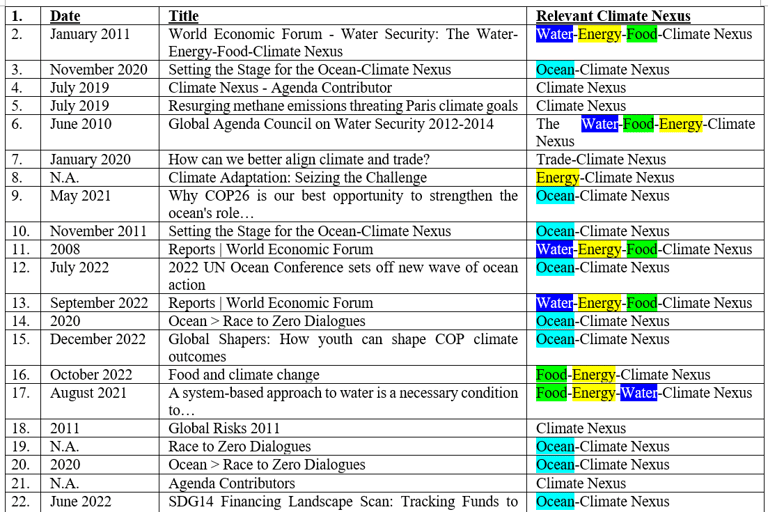Climate Nexuses In The Work of The World Economic Forum
I searched for references to the phrase “climate nexus” on the website of the World Economic Forum (“WEF”). The search page (https://www.weforum.org/) is summarized in Table 1 below in order of appearance.
On its face, Table 1 contains 23 references to energy as a component which interacts with a climate nexus, 18 references to the ocean, 18 references to food, 16 references to water, 3 references to land, 3 references to biodiversity,1 reference to COVID19, 1 reference to Sustainable Development Goals (“SDGs”), and 1 reference to trade.
The focus on energy is unsurprising given the WEF’s mission is “to shape global, regional and industry agendas” and “demonstrate entrepreneurship in the global public interest while upholding the highest standards of governance”.
According to its latest annual report, the WEF’s explicit engagement with the nexus approach was limited to the water security-energy nexus, as evidenced by its work in promoting freshwater availability by way of the 50L Home Coalition (WEF 2022:107).
Its commitment to climate, however, seems to be more comprehensive, with its 2021-2022 annual report containing 113 references to climate. Specifically, the WEF appears to demonstrate its commitment to climate progress with the establishment of the Centre for Nature and Climate (CFN) (WEF 2022:32).
The CFN appears to adopt a general nexus approach in substance if not in form, as evident in its cross-sectoral integration between business, governance, policy, society, and technology (WEF 2022:26). The CFN’s agenda would also seem to capture some elements of the trade-climate nexus (“fast-tracking towards a nature-positive economy”) and the eco-climate nexus (“regenerating food, ocean and water systems”) (WEF 2022:28).
An implicit application of climate nexus approaches could be helpful in policy and business circles where there may be buzzword fatigue. In my view, an organization’s actual application of a nexus approach in its activities is more important than whether it explicitly acknowledges its use of such an approach. Explicit engagement with the nomenclature is perhaps more crucial within the scientific and research communities in developing and demonstrating linkages with the nexus methodology.
However, in the specific case of the WEF, given that the latest annual report contains no mention of either synergies or trade-offs, it could well be that the organization does not consider the climate nexus framework to be necessary or important praxis.
References:
World Economic Forum (“WEF”). ‘Annual Report 2021-2022’. https://www3.weforum.org/docs/WEF_Annual_Report_2021_22.pdf
Table 1





